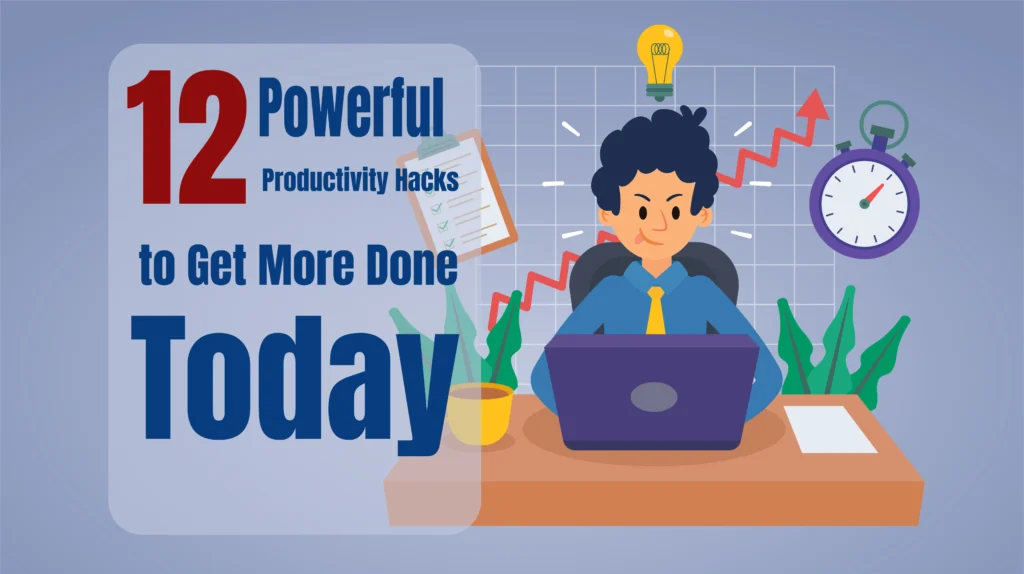How to Manage Your Time Effectively as an Entrepreneur
Entrepreneurship comes with countless responsibilities that can easily become overwhelming. From handling day-to-day operations to developing long-term strategies, entrepreneurs are constantly balancing tasks that demand their attention. Time is one of the most valuable resources for any business owner, but it’s also one of the most limited. Without proper time management, entrepreneurs risk burning out, missing opportunities, or getting caught up in busywork that doesn’t contribute to their goals.
In this guide, we’ll explore proven strategies for managing time effectively as an entrepreneur, covering everything from task prioritization to using technology for increased efficiency. By implementing these methods, you can regain control of your schedule, focus on what matters most, and build a more sustainable work-life balance.

The Importance of Time Management for Entrepreneurs
Entrepreneurs are often responsible for nearly every aspect of their business, especially in the early stages. From sales and marketing to product development and customer service, the list of tasks can seem endless. This makes time management critical. Entrepreneurs who lack effective time management skills often find themselves overwhelmed, unable to focus on strategic initiatives that drive growth.
Good time management allows entrepreneurs to focus their energy on high-impact activities, avoid burnout, and maintain a healthy balance between work and personal life. It also helps in reducing decision fatigue by creating a structured approach to tackling the day’s most important tasks. With the right time management practices, entrepreneurs can be more productive, reduce stress, and position their businesses for long-term success.
Common Challenges Entrepreneurs Face with Time Management
Entrepreneurs often face several time management challenges that can disrupt their focus:
- Time Scarcity: With only 24 hours in a day, it can be challenging to get everything done. The constant juggling of responsibilities makes it easy to feel like there’s never enough time.
- Distractions: Entrepreneurs are frequently interrupted by phone calls, meetings, emails, and social media. These distractions can significantly reduce productivity if not managed properly.
- Multitasking: Many entrepreneurs attempt to multitask to keep up with demands, but this often leads to poor results and wasted time. Research has shown that multitasking reduces efficiency and leads to mistakes.
- Lack of Structure: Without a clear plan, entrepreneurs may waste time figuring out what to do next, leading to reactive, rather than proactive, work habits.
By understanding these challenges, entrepreneurs can implement strategies that streamline their workflow, minimize distractions, and ensure that their time is spent on tasks that matter most.
Understanding Time and Task Prioritization
Effective time management starts with knowing how to prioritize tasks. Entrepreneurs must differentiate between tasks that have a real impact on the business and those that can be deferred, delegated, or eliminated.
Differentiating High-Value vs. Low-Value Tasks
Not all tasks are created equal. High-value tasks are those that directly contribute to the growth and success of the business. These include activities like sales, marketing, product development, and strategic planning. Low-value tasks, while necessary, don’t have the same immediate impact on the business’s bottom line. Examples include administrative work, scheduling, and minor troubleshooting.
To maximize efficiency, entrepreneurs should focus on high-value tasks first and handle low-value tasks later or delegate them to others. Prioritizing this way ensures that time is spent on activities that move the business forward rather than getting bogged down in routine operations.
Urgent vs. Important Tasks
One of the biggest challenges in time management is distinguishing between tasks that are urgent and those that are important. Urgent tasks are those that require immediate attention but may not be important in the long run. These can include phone calls, minor customer service issues, or administrative tasks. Important tasks, on the other hand, contribute to the long-term success and growth of the business but may not have pressing deadlines.
To manage time effectively, entrepreneurs must prioritize important tasks over urgent ones whenever possible. This involves taking a step back to assess whether a task truly warrants immediate action or if it can wait, allowing more time to focus on long-term goals like business development and strategy.
≫ Related Post: How an Entrepreneur Should Prioritize Tasks
Methods for Managing Time Effectively
There are several proven techniques entrepreneurs can use to better manage their time and ensure that they are focused on high-priority tasks.
Time Blocking
Time blocking is a time management technique where entrepreneurs allocate specific blocks of time to certain tasks or activities. By scheduling tasks into dedicated time slots, entrepreneurs can reduce the likelihood of distractions and ensure that important work is completed during the most productive hours of the day.
For instance, an entrepreneur might block off the first two hours of the morning to focus on strategic planning or product development. Later in the day, another block of time might be reserved for responding to emails or handling administrative tasks. This approach creates structure and helps entrepreneurs avoid multitasking, which often leads to decreased efficiency.
The key to successful time blocking is being realistic about the amount of time each task will take and ensuring that sufficient breaks are scheduled between work sessions. This prevents burnout and ensures that the entrepreneur maintains focus throughout the day.
The Pomodoro Technique
The Pomodoro Technique is another effective time management strategy that helps improve focus and productivity. Developed by Francesco Cirillo, this technique involves working in short, focused bursts (typically 25 minutes) followed by a 5-minute break. After four work sessions, a longer break of 15–30 minutes is taken.
This method is particularly useful for entrepreneurs who struggle with distractions or procrastination. By breaking tasks into manageable intervals, it’s easier to maintain concentration and avoid burnout. The short breaks help refresh the mind, making it easier to dive back into the next work session with renewed focus.
The 80/20 Rule (Pareto Principle)
The Pareto Principle, also known as the 80/20 rule, states that 80% of results come from 20% of efforts. For entrepreneurs, this means that a small portion of tasks often delivers the most significant outcomes. Identifying and focusing on these high-impact activities can dramatically improve time management.
For example, if 20% of your clients generate 80% of your revenue, you should prioritize tasks that nurture and grow those key relationships. Similarly, entrepreneurs should focus on the 20% of tasks that directly contribute to revenue growth or business development and reduce the time spent on less impactful activities.
Using Tools and Technology to Improve Time Management
In today’s digital world, technology offers several tools that can help entrepreneurs manage their time more effectively.
Task Management Software
Task management software is a valuable tool for organizing and tracking tasks, projects, and deadlines. Some popular options include:
- Asana: A project management tool that allows entrepreneurs to create tasks, set deadlines, assign tasks to team members, and track progress across different projects.
- Trello: A visual task management tool that uses boards, lists, and cards to organize tasks. Entrepreneurs can easily move tasks between stages and keep track of what’s done, what’s in progress, and what’s upcoming.
- Monday.com: A flexible platform that helps entrepreneurs plan, track, and manage tasks. Its visual interface makes it easy to prioritize and assign work to team members.
Automation Tools
Automation tools can handle repetitive tasks, freeing up time for more strategic work. Zapier is one such tool that allows entrepreneurs to automate workflows between different apps, such as automatically sending emails, updating spreadsheets, or posting to social media when certain conditions are met. Automation reduces manual effort and ensures that routine tasks don’t consume too much time.
Time-Tracking Apps
For entrepreneurs who want to improve their time management skills, using a time-tracking app like Toggl or Clockify can provide valuable insights into how time is spent. These apps track how much time is dedicated to specific tasks, helping entrepreneurs identify inefficiencies and make adjustments to their schedule. Time tracking also helps entrepreneurs stay accountable and focus on high-priority activities.
The Importance of Self-Care and Work-Life Balance
Effective time management isn’t just about getting more done—it’s also about maintaining balance and avoiding burnout.
Avoiding Burnout
Entrepreneurs who constantly push themselves to the limit without breaks are at risk of burnout. Burnout can lead to physical and mental exhaustion, reduced productivity, and even long-term health problems. To avoid burnout, entrepreneurs should prioritize self-care, set boundaries between work and personal life, and ensure they take time to rest and recharge.
Scheduling Breaks and Downtime
Taking regular breaks throughout the workday is essential for maintaining productivity and focus. Entrepreneurs should schedule short breaks every 60–90 minutes to step away from their desks, stretch, and refresh their minds. Additionally, longer periods of downtime—such as weekends or vacations—are crucial for maintaining a healthy work-life balance and ensuring long-term productivity.
Conclusion: Building a Sustainable Time Management System
Time management is an ongoing process. Entrepreneurs should regularly review their time management practices, track their progress, and make adjustments as needed. As the business grows, priorities will shift, and the time management strategies that worked early on may need to evolve.
Ultimately, effective time management requires a mindset shift. Entrepreneurs must recognize that managing their time is not just about squeezing more tasks into the day, but about focusing on the activities that truly matter. By adopting a long-term approach to time management, entrepreneurs can build a sustainable workflow that supports both their business growth and personal well-being.
















